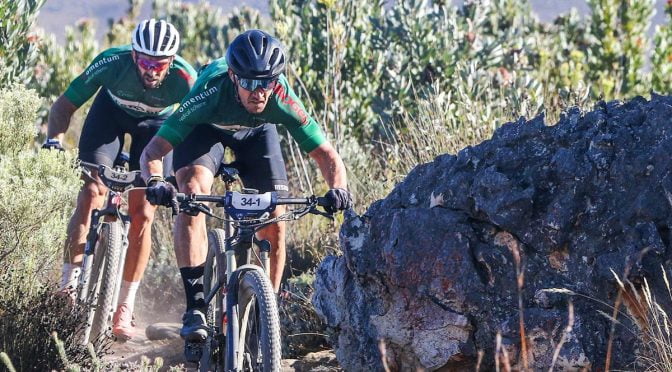
By Dr Craig Uria and Prof Mike Posthumus, riding for Restonic at the 2023 Absa Cape Epic
Sleep is a vital component of overall health and well-being, and it plays an especially important role in athletic performance, including cycling. Adequate sleep is essential for physical recovery, cognitive function, and overall health, all of which are crucial for optimal cycling performance.
Sleep has been suggested to be the best recovery strategy available to any athlete. This is likely because sleep is an optimal condition for cell growth and repair, especially during the slow wave sleep phase (also called deep sleep). In addition, during sleep, the body produces growth hormone and testosterone, which are essential for muscle repair and growth.
Sleep happens in different stages. Stage 1 is very short and light, during which time you are still alert and can easily be woken.
Stage 2 is also light, however there is a sudden increase in the frequency of brainwave activity followed by a “slowing down”.
Stages 3 and 4 are deep sleep. There is no eye movement or muscle activity and it is very difficult to be woken. It’s in these deep sleep stages where most of the physical growth and repair occurs.
The next stage of sleep is rapid eye movement (REM) sleep, during which your brain activity spikes, you dream, your eyes “dance” and your heart rate, blood pressure and breathing rate increase. REM sleep first occurs about 90 minutes after initially falling asleep, but you may have five or six REM cycles per night, which last up to an hour.
REM stage leads to learning and developing memories and new information is consolidated in order to be stored in the long-term memory “bank”.
Because of our “sleep architecture”. Experiencing broken sleep can lead to significant health and performance effects. This is due to incomplete sleep cycles, which limit the amount of deep and REM sleep one gets – the sleep required for recovery.
Research studies have shown that extending sleep for sleep-deprived athletes results in improved physical and cognitive function. More specifically, results have shown improvements in sprint times, reaction times and skill-based tasks.
Sleep deprivation studies in athletes have also demonstrated that sleep loss impacts performance of athletes through both physical and cognitive pathways. This is particularly important for cyclists, as cycling is a demanding sport that requires a high level of physical endurance, as well as skill and alertness to race safely and avoid catastrophic injury.
Sleep has been suggested to be the best recovery strategy available to any athlete. This is likely because sleep is an optimal condition for cell growth and repair, especially during the slow wave sleep phase (also called deep sleep).Dr Craig Uria and Prof Mike Posthumus
In one cycling-specific sleep performance study from the University of Cape Town, researchers investigated the effect of a single night of sleep on recovery after a high intensity training session. The session used here was a 18 x 1 min hard interval session (HIT). Lab tests were done prior to and 24 hours after the HIT interval session. All participants in the study slept and trained in the sleep lab at the Sports Science Institute. The researchers ensured that half the participants slept the same amount they normally do. The other half were only allowed to sleep 50% of the duration they normally sleep (this was the sleep-deprived group).
The study demonstrated that sleep deprivation resulted in a significant difference in the peak power output (PPO) 24 hours after the HIT training session. The sleep-deprived group produced, on average, 18 watts less PPO compared to before the HIT session. The group that slept normally were able to produce the same PPO 24 hours after the test.
This demonstrates just how important sleep is for recovery, especially after a very hard training session. If bad sleep quality and quantity become a regular occurrence, these small losses will eventually add up and results in significant effects on overall performance.
It was also important to note that in the sleep-deprived group, blood pressure and sleepiness increased, and mood decreased. The blood pressure finding is particularly interesting as this indicates that participants’ autonomic systems were affected by the lack of sleep. The lack of sleep resulted in increased sympathetic (high and flight) and decreased parasympathetic (rest and digest) nervous system activity.
Beyond athletic performance, sleep also plays an important role in overall health, which is crucial for cycling performance.
Studies have shown that individuals who don’t get enough sleep are at a higher risk of developing chronic health conditions, such as obesity, diabetes, and heart disease. Sleep also plays a role in regulating our weight and metabolism. Studies have shown that a lack of sleep correlates with weight gain and an thereby an increased risk of obesity, whereas adequate sleep helps to regulate our metabolism and maintain a healthy weight.
Adequate sleep can also help to boost the immune system, making cyclists less susceptible to infections and illnesses. Staying healthy through bouts of increased training load can significantly affect fitness levels by decreasing time lost to illness.
While seven to nine hours of sleep is the range recommended for healthy adults, studies suggest that athletes may require nine to 10 hours of sleep time to reach their full potential. A study found that elite athletes require eight hours sleep a night to “feel” rested and 71% of athletes fail to meet this need on most nights. There are no specific sleep guidelines for athletes and it is not known whether athletes actually need more sleep, due to limited research. However, it’s important to ensure that if you’re training hard, you’re also prioritising your sleep.
Read more about how you can improve your sleep in our 5-step guide to a good night’s rest.

Dr Craig Uria, respected chiropractor and elite sportsman, holds a Postgraduate Diploma in Performance Nutrition, an international certification in Paediatrics through the Angolo-European College of Chiropractic, as well as an International Chiropractic Sports Science Diploma (ICSSD). He is also the founder of Spine and Sport Centre.

Prof. Mike Posthumus is a sports scientist, sports performance consultant and coach. He holds a PhD in Exercise Science from the University of Cape Town (UCT), and is currently an adjunct associate professor at UCT within the division of physiological sciences. He has published more than 65 peer-reviewed scientific manuscripts and is also a competitive athlete.
Like what you see on this page? Go on, please share it…
© RESTONIC (Pty) Ltd 2023. A division of Restonic (Pty) Ltd
Privacy Policy | Terms & Conditions | Manage My Cookie Preferences | Trust Centre
Site by Crowberry Media